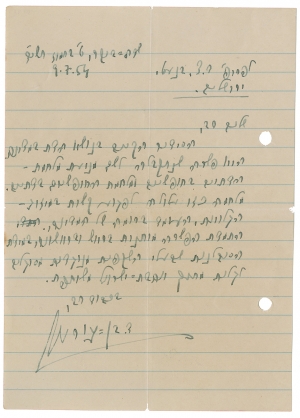|
David Ben-Gurion ALS—Preventing a War between the Religious and the Secular in Early Israel |
Click to enlarge:

“The continuance of the compromise is dependent, first and foremost, on the degree of tolerance that people who hold opposing outlooks can show through a mutual love of Israel.”
DAVID BEN-GURION.
Autograph Letter Signed, to D. Z. Benat, July 9, 1954, Jerusalem, Israel. In Hebrew, 1 p., 6½ x 9 in.
Inventory #26100
Price: $7,500
Complete Translation
Shalom Rav (Greetings),
The existing arrangement regarding the religion in the State is a compromise that was accepted in order to prevent a war of the religious against the secular and a war of the secular against the religious. That kind of war may seriously hurt the fusion of the Diaspora, which stands as a top priority of the State.
The continuance of the compromise is dependent, first and foremost, on the degree of tolerance that people who hold opposing outlooks can show through a mutual love of Israel.
Respectfully,
D. Ben-Gurion
Historical Background
During the British mandate (as well as the Turkish government before them), Jews were recognized as an autonomous religious group, and rabbinical authorities had control over all matters of Jewish religious practice. As statehood approached in the mid-1940s, various political orthodox groups expressed concern that a secular Jewish state would erode the special status the rabbinate enjoyed.
Ben-Gurion was a secular free-thinker who refused in principle to wear a kippah at funerals. Nevertheless, as early as June 1947, he gave religious movements a written guarantee to maintain the religious “Status Quo” to avoid a potential “war of the Jews” and to win over the large, religious Zionist constituency. The “Status Quo” was never a static or permanent agreement. It has been changed and modified over the years, in both directions.
David Ben-Gurion (1886-1973) was born in the Kingdom of Poland, then part of the Russian Empire, as David Grün, and he studied at the University of Warsaw. In 1906, he immigrated to Palestine, which was part of the Ottoman Empire. In 1912, he moved to Constantinople to study law and adopted the Hebrew name Ben-Gurion. He supported the Ottoman Empire in World War I, but was deported to Egypt and traveled to the United States, where he remained for three years. After the Balfour Declaration of 1917, he joined the Jewish Legion of the British Army. He returned to Palestine after the war and became a leader of the Zionist movement. As head of the Jewish Agency from 1935, Ben-Gurion was effectively the leader of the Jewish population before there was a nation. He accepted the 1947 partition plan as a compromise that would establish a Jewish state, and declared the independence of the state of Israel in May 1948. After leading Israel during the 1948 Arab-Israeli War, Ben-Gurion won election as Prime Minister of Israel in 1948 as head of the Mapai political party in the Knesset. He resigned in December 1953, effective January 26, 1954, then resumed office in November 1955 and served as Israeli Prime Minster until 1963. He then moved to Sde Boker, a kibbutz in the Negev desert, where he lived until his death.